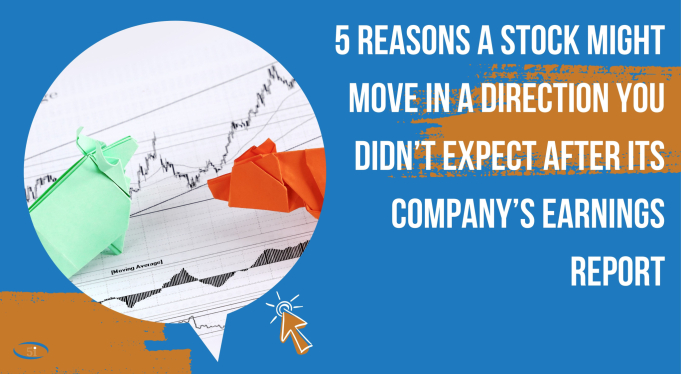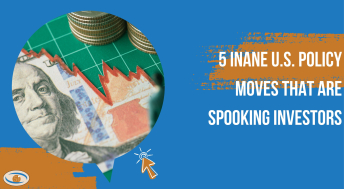Good results may still mean the stock plunges, and vice versa. Why is this?
You, like most investors, have likely once owned a stock, and then that company reports very solid earnings. And then it plunges. Or, a company reports horrible earnings, and then the stock rises sharply. You shake your head, and wonder what’s going on.
Since we are right now smack-dab in the middle of earnings season, we thought this might be a good topic for discussion.
Let’s look at five reasons a stock might move following an earnings report.
Non-company news
There are lots of non-company events that can move stocks, and even overshadow an earnings release. For example, next week’s U.S. election might see lots of stocks move dramatically, whether their third-quarter earnings are good or bad. Or, a competitor might report good or bad news, overwhelming a company’s own earnings report. Or, an interest rate change, geopolitical events or simply a bad (or good) market day might cause a stock to move sharply in the opposite direction to its earnings report.
Results versus estimates
Stocks move on expectations primarily, especially in the short term. So many investors these days are focused on quarterly results, which means that stock moves can be quite dramatic. We prefer a longer-term approach, but it is what it is — expectations, and whether a company beats or misses those expectations — drive stock prices nowadays. A company reporting 80 cents per share in earnings when Street estimates were 40 cents can see its stock move a lot, though there are other factors at play as well, as we will see below.
Company news
Often, a company will announce other news in tandem with its quarterly earnings releases. This news might be highly positive, or completely negative, and can, at times, overwhelm the news of the company’s actual earnings. For example, companies tend to announce acquisitions at the same time as earnings. Or, they can announce major management shake-ups (this typically happens with bad numbers). Or, they might announce a dividend increase along with some bad earnings, in order to soften the blow to investor. (We see this quite a lot, actually. We try to focus on the results, and not the “sweetener” of a higher dividend.)
Guidance and management commentary
Of course, in addition to expectations as discussed above, a company’s guidance and commentary are of utmost importance. For investors, it really doesn’t matter if you blew past estimates if the future is not going to be as good. Sometimes, one wonders where analysts actually get their estimates. Last year, Nvidia Corp., almost the largest company in the world by market cap, came out one quarter with a forecast of US$11 billion in sales. Analysts expected US$7 billion. That’s a pretty big swing in forecasts, and we all know how the stock has done in the past year following that guidance (up over 200 per cent). Management commentary is equally important. Companies tend to be positive, but also need to face reality. This earnings season, we have seen a few companies discuss “delayed orders” or “weakness in consumer spending.” It is something to be watched, but, so far, management commentaries from reporting companies has been pretty good.
Valuation
At times, companies have great earnings, a great forecast and great management comments. And still the stock goes down. This can confuse investors more than the other four points discussed above: “If everything is great, why is my stock down?” Usually, this is related to valuation. Yes, expensive stocks can get more expensive. But sometimes, stocks are priced to near-perfection. Even a “perfect” earnings report is not enough if investors were expecting “better than perfect.” High valuation stocks can see profit taking on even the best news. Sellers can come in on a perfect report on the belief that “things can’t possibly get better than this.” Some investors will sell when brokers’ target prices are hit, which tends to happen when numbers are good.
Our conclusion here? Well, quarterly earnings reports certainly cannot be ignored. But, as noted, we prefer looking at the long-term trend instead. We try not to let a bad quarter shake us out of a high-quality company. Business conditions can change, and a quarterly miss is not the end of the world. A 90-day period means little if you are investing for 10 years. We also try not to react to stock movements around quarterly reports. Often, the initial reaction is wrong, and we’ve seen stocks quickly reverse short-term moves.
Focusing too much on one quarter can result in investors getting caught in highly volatile, yet ultimately meaningless, stock swings.
Unlock the Power of Informed Investing with 5i Research!
DIY investing doesn't have to mean going it alone. At 5i Research, we're your trusted partner in navigating the stock market. Our platform offers comprehensive stock and market research, empowering you to make smart investment decisions.
- Investor Q&A: Have burning questions? Get answers from our team of experts and fellow investors in our dedicated Q&A section.
- Research Reports: With over 60 meticulously researched Canadian stocks, our reports offer in-depth analysis, giving you the confidence to invest wisely.
- Model Portfolios, Alerts, Forums, Portfolio Tracking, and Much More.
Take Care,







Comments
Login to post a comment.